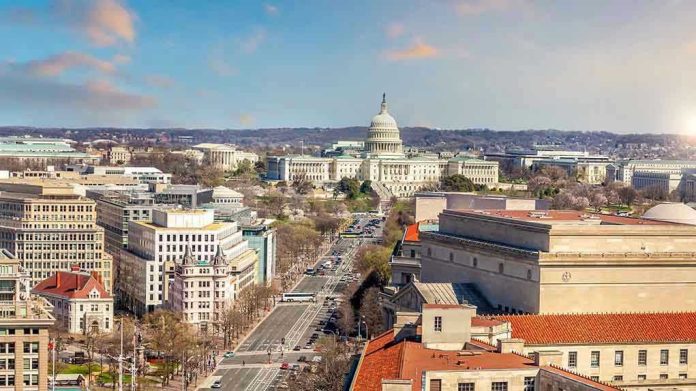
A direct presidential threat to override D.C.’s home rule has sparked intense debate, raising questions of federal overreach and local autonomy.
Story Highlights
- President Trump threatens to federalize Washington, D.C. following a violent incident.
- Trump criticizes D.C.’s local leadership and calls for prosecuting juveniles as adults.
- The threat renews debates over federal intervention and D.C.’s autonomy.
- Crime data shows a decrease, contradicting claims of a crime surge.
Trump’s Bold Threat to D.C. Autonomy
On August 5, 2025, President Donald Trump made a public declaration to potentially “federalize” Washington, D.C., citing the need to address what he described as rampant violent crime. This threat followed an alleged assault on a Department of Government Efficiency (DOGE) staffer, who was reportedly attacked by teenagers while assisting a woman. Trump’s comments, shared via Truth Social, criticized the local leadership’s handling of crime and called for harsher penalties for juvenile offenders.
Federal Intervention: A Controversial Proposal
Historically, Washington, D.C. has exercised home rule since 1973, allowing an elected mayor and city council to govern the city while Congress retains overarching authority. Trump’s threats to impose federal control have reignited discussions on the balance between federal oversight and local governance. Critics argue that such intervention could undermine D.C.’s autonomy, setting a precedent for similar actions in other cities facing crime challenges.
The President’s comments have also sparked a political maelstrom, with D.C. officials defending their management and highlighting crime statistics that show a decline in violent crime rates. These figures, which reveal a 35% decrease in 2024 continuing into 2025, challenge the narrative of a crime wave.
Implications for Crime Policy and Governance
The ongoing discourse has significant implications for urban policy and the future of D.C.’s governance. If federal intervention were pursued, it could lead to a shift in how cities manage their own affairs, potentially diminishing local control. Moreover, the call to prosecute juveniles as adults has raised concerns among justice advocates, who warn of the long-term consequences on youth rehabilitation.
Trump’s assertions, while resonant with his tough-on-crime rhetoric, face legal and political hurdles. Only Congress can revoke D.C.’s home rule, and historical precedents show that such actions are rare and fraught with controversy. As the situation unfolds, the debate continues over the appropriate balance of power and the best strategies to ensure safety and justice.
Sources:
Trump threatens D.C. autonomy after violent assault
Trump threatens federal control of D.C.
Trump warns of federal takeover amid youth violence














